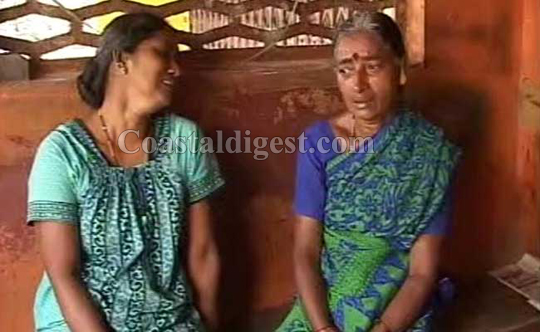Udupi, Aug 20: A pall of gloom descended on the house of BJP worker Praveen Poojary, who was beaten to death three days ago by a group of Hindutva activists for allegedly trafficking cows, and his family is finding it difficult to accept the reality that he is no more.

"These were people known to us. Why did they do this to my son?," sobbed Praveen's mother Baby Poojary, mourning the son who was her oldest and most gentle.
“Those people also must suffer the same way for what they did,” she cursed sitting on the verandah of her house at Kenjoor village, 3km from Santhekatte in Udupi.
Relatives and neighbours find it hard to accept that the alleged killers were people the family had known for years. Many of the attackers often visited his chicken shop and had reportedly had meals at his home in the past.
Pramila Poojary, Praveen's sister, said the family was not well off but her brother had come up by dint of sheer hard work and set up his own business, which was resented by many. He was also a local BJP leader.
Praveen, owned a tempo rickshaw and ran a chicken stall in his village. He headed a standing committee of the BJP's Santhekatte unit.
Ramesh Poojary, a relative, said the way his van was waylaid gave rise to suspicion. “When he was called at 8 p.m., he did not even know it was for transporting cattle,” he said.
Praveen's father Vasu said his son "left at 8.30 pm for some work" at his shop. "At 10.30 they brought him...the police came too, but he died in hospital."
Praveen's classmate Santhosh Shetty said he had never once seen his friend lose his temper, no matter the provocation. "They (the attackers) were Praveen's customers in his shop. Young boys in nearby villages have been indoctrinated and armed with weapons - we have never seen such conflict before," said Mr Shetty.
Panchayat member Geetha added: "He was never argumentative, never aggressive. We cannot believe that this has happened to him."
Also Read:
Some Sangh Parivar activists indulging in illegal cattle trade: Former BJP MLA
After BJP worker's murder, Hindutva groups disown Udupi cow vigilantes
'Cows rescued' by vigilantes in coastal Karnataka end up in slaughterhouses'
Udupi: Slain BJP worker's family accuses Hindutva activists of backstabbing






Comments
How can YOU say its illegal,
Cows can be slaughtered if old or diseased. possession not a crime. bill proposed by BJP in 2010 in karnataka made slaughter punishable by 7yrs jail and Rs 1 lakh fine. BUT it did not BEcome LAW.
HEY KIRAN, ASK YOUR MOTHER SAME THING HAPPEN TO YOU WHAT WILL BE HER SENTIMENTS,,SHAME ON YOU...
EVERY DOG AS A DAY...WAIT FOR IT...
one lesson gaurakshak's should understand, mother lost her son that nobody can take that place, bread winner of the family lost by whole family.
i respect mother sentiments, still u Couldn’t stop your son by doing illegal transportation. u deserve for what u did. better luck next time.
Add new comment